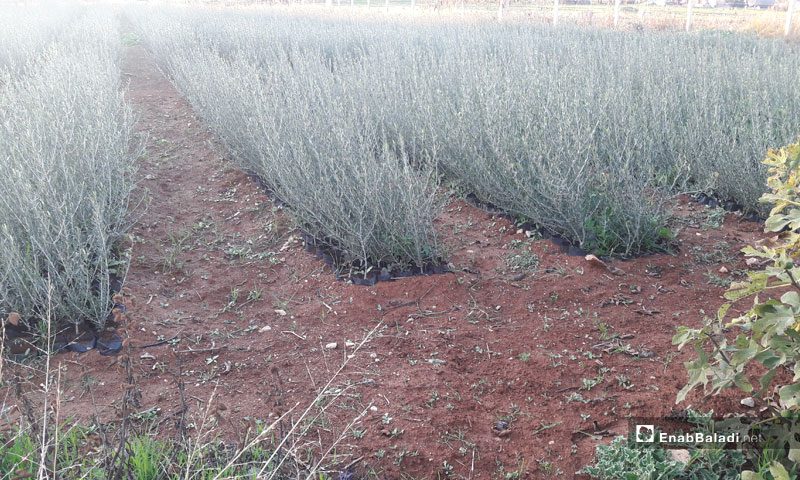



“Following the army’s entry to the area, our job at Tell Shihab’s plant nursery stopped. We addressed the Agriculture Directorate and provided the demanded documents to return to work. But we were surprised that the electricity generator was pulled out of the nursery, after which the planters were deported, without any hope of returning to work any soon.”
This is how Abu Mohammad described the situation in his village, and he is one of the former employees at the Tell Shihab’s Plant Nursery, rural Daraa, who lost their job after “Assad’s forces” made their way into the governorate last July, under a settlement deal, facilitated by an intensified military campaign.
Late in November and early in December, the Agriculture Directorate under the government of the Syrian regime, Daraa governorate, started departing the olive planters from Tell Shihab’s plant nursery to the city of Izra, ignoring the fact that moving the planters during this time of the year would be harmful.
The Agriculture Directorate have also deported the electricity generator last month, which operates the pumpers that water the planters.
After the many efforts the employees made to rehabilitate the nursery, the Agriculture Directorate dismissed them once it dismantled the nursery.
Though the Directorate promised to get them back on job, none of the dismissed employees are rehired.
The area’s plant nurseries provided more than 40 job opportunities, while on the rise as the work expanded. However, Assad’s forces entry to the Southern area, the dismantling of the nursery and the Agriculture Directorate becoming in control made this impossible, according to a member of the Provincial Council.
One of the dismissed employees, on the condition of anonymity, explained to Enab Baladi the effect that the dismissal had on his colleagues’ and his life, saying: “The job provided us with an income that helped us face life’s difficulties. We started with small salaries, but with the production developing, our salaries were getting better, until they reached 40 thousand Syrian pounds (about $95).”
A former member of the Free Daraa Provincial Council, on the condition of anonymity, told Enab Baladi: “In the beginning, the idea focused on the preservation of public possessions and trying to gradually bring the plant nurseries to production. Despite the weak resources and shortage on equipment, we managed to put the first block in place and continued till the nurseries’ production arrived at an excellent phase, after the nurseries were adopted by Syria Project for Basic Services, under the supervision of the Agricultural Office of the Daraa Provincial Council.”
The plant nurseries’ rehabilitation in Southern Syria started in 2015, after three years of absence, caused by the security conditions under which the area endured. The governorate succeeded in getting back some of its agricultural activities, challenging the lack of resources, infrastructure and funding, designated for the project.
The former member of the Provincial Council added: “Within the first plan of the Syria Project for Basic Services, the nursery managed to produce 700 thousand olive planters, in addition to producing pomegranate, walnut, apricot, peach, quina and cypress planters.
In the second year, the plan was larger and expanded to cover the the Provincial Council’s nurseries back then, [Tell Shihab Central Plant Nursery]. The administration of the nurseries distributed planters on the Southern area’s farmers for symbolic prices. When the olive planter was being sold for 2500 Syrian pounds, the administration sold them for 200 Syrian pounds. Additionally, large numbers of quina trees were produced, so that the plant nurseries have a key role in the reforestation of public places.”
In 2016, the Syria Project for Basic Services adopted a productive plan that managed to enhance the nurseries’ production capacity, for the Project provided the nurseries with electricity generators, greenhouses used for propagation by cuttings and other needs, including the employees’ salaries for a whole year.
The project also supplied the nurseries with green houses and raw materials for cutting olive planters, which requires technical and logistic experience, taking into consideration the sensitivity of the cuttings, when it comes to adaptation to the environment and right degree of temperature.
On the condition of anonymity, an agricultural Engineer, from Tell Shihab village, working independently from the nursery’s team, told Enab Baladi that the nurseries spared the people the high costs of buying planters.
He added: “Today, after the people hoped for the return of the governmental establishments and continuing their work under the already active ones, which have been kept running, we see that the government is following the methodology of desertification of the nurseries. Instead of completing from the point reached by the team of the Nurseries’ Administration, it buried the idea and cut the water for the green of the trees to die and turn into rubble once again.”
The Tell Shihab nursey is one of the ancient nurseries in Syria, dating back to 1948, when it specialized in the production of olive planters through vegetative reproduction.
The Ministry of Agriculture used to export the nursery’s products of olive to the majority of the Arab countries, particularly Jordan, Iraq, Saudi Arabia, Qatar, Sudan and Oman.
In 2012, the nursery became out of service when the regime lost control over the area, according to which the ownership of the public lands of the nursery was privatized with some citizens investing in them, making use of the security chaos.
This year, nonetheless, the southern area’s nurseries managed to export their products to Hama, Quneitra and Hauran, despite the difficulty of finding constant export roads between the Syrian governorates
The nursery also worked to cover the southern area’s agricultural needs, and lately it sold 60 thousand quina planters for 100 Syrian pounds each, while grafted apricot, peach and plum are sold for 200 Syrian pounds each, in addition to the Pear planters, the price of which vary between 300 and 400 Syrian pounds each.
if you think the article contain wrong information or you have additional details Send Correction